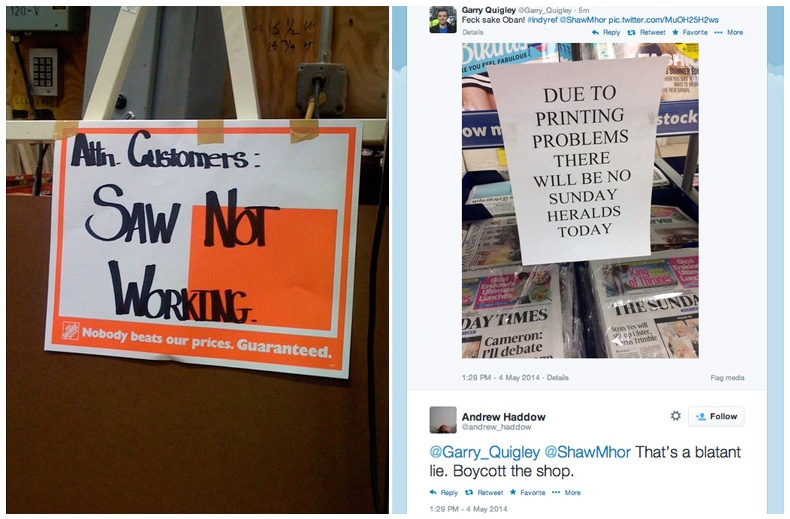Benjamin Franklin once said, “Honesty is the best policy”.
Even though this bit of wisdom is over 2500 years old, it’s something that apparently eluded the folks at Volkswagen.
Unless you’ve been out of touch with the news in the last little while, you’ll know that Volkswagen skirted environmental regulations such as the Clean Air Act for their diesel cars. This culminated in arguably the largest fiasco in the automotive industry.
Many are still at a loss at what would compel a company to lie to customers and regulatory agencies on such a large scale. Yet we only need to look to ourselves for the answer.
Like it or not, we lie a lot and we do it often. Research found that people lie and deceive each other almost instinctively for variety of reasons. The main one by far, noted Robert Feldman, a professor of Behavioral Science at University of Massachusetts, is to impress others.
You’re not immune from doing whatever it takes to impress customers – even if you’re a behemoth like Volkswagen.
Lying is a pre-programmed instinct to protect ourselves, increase our social standing and to smoothly build rapport with a stranger – in this case – your customer. Since lying is such a big part of our lives, is it possible to lie and still come out on top?
Many companies out there clearly think so. Here are four reasons why they continue to lie to their customers:
1. To “protect the customer”
When you ask adults why they lie to kids, the most common answer they give is to protect them. True, kids do need protecting. A bad neighborhood in a big city isn’t exactly the type of environment you want for a newborn child.
During birthday parties we tell our children to be polite and like the gift they’ve been given even though they may not like it. While our intention is to instill good manners, we also condition our children into believing that elaborate lying itself is synonymous with good manners.
Companies are guilty of this, too. Take Apple employees who lie to customers about things like why they shouldn’t unlock their iPhones. Obviously Apple wants phones locked to its own carriers, but associates take it too far by claiming it’s for the customer’s own good.
Another example is a Ford engineer revealing to NPR that when the gas gauge shows “full”, the car is not actually full. What might be the motive for this revelation? Are customers supposed to feel more secure about driving on empty, now that they have a “pessimistic” gas gauge?
If you place your interests under the guise of protecting customers, you’ll have plenty of work cut out for you. You’ll constantly have to fight for customer trust, make things up and cover your tracks.
Is a small lie acceptable in the name of profit? The obvious answer would be no. But what if there are good intentions behind it? That’s up for you (and your customer) to decide.
2. To elevate their brand
It’s unfortunate that people judge based on appearance, but first impressions are of paramount importance. Simply wearing the right type of clothes or accessories don’t just attract compliments, it helps you build rapport with strangers, as demonstrated below:
Neil Patel is a successful internet marketer who closes six-figure deals on regular basis. He decided to run an experiment and find out whether wearing big-ticket items would increase the number of deals he would close (in other words make him money). Neil would wear a $6,000 watch doing everyday activities including networking events. He repeated the same experiment with a more flashy $28,000 gold watch and then a conservative-looking $50,000 Patek Philippe.
Sure, these watches weren’t his but wearing them led to introductions that secured marketing deals which made him four to five times as much money. Sure, Neil was lying about his possessions – but where do we draw the line on what’s “right” and “wrong”?
3. To mask their shortcomings
We already demonstrated that it’s human nature to hide (or lie about) our weaknesses to save face.
Kind of like support staff saying “I’m the manager” when a customer demands to speak to one. That’s a lie. Everyone has a manager – even the CEO of the company. It reminds me of a story from Seth Godin’s blog about a Home Depot cutting station that had this sign up:
It turns out that whenever they don’t feel like using the saw, they pretend it’s broken. Technically, they didn’t say ’broken,’ they said ’not working,’ which is sort of true. Except it was the saw operator who wasn’t working.
When businesses try to cover up a shortcoming or mistake, they must remember that dishonesty can (and likely will) be picked up by the customer. It doesn’t matter even if they’re trying to fix the situation. We’re all human, we’re vulnerable and make mistakes, so it shouldn’t be treated as the end of the world.
4. They can get away with it
With so much noise about transparency in the SaaS sphere, it becomes clear that it’s not a big, scary monster that some make it out to be. It’s been accepted that things we are usually scared about revealing are usually not a big deal to others at all.
However, it’s also something that exposes our weaknesses. And companies tend to use a lot of resources to protect their ability to mislead us.
There is little room to lie when your essential statement is, say, “It’s a phone. You can call with it and take photos.” But multiple companies have made the argument – in court – that not only does their ads not have to be factual, but only an idiot would think they were. – Cracked.com
We look at everything from car insurance billboards to nutritional information on instant dinners and see fine print and misleading portion sizes.
With the constant quest to big up our products, there is a fine line between marketing your strengths and lying about them. The key in avoiding these headaches is simple: be honest within your organization and your customers.
It will go a long way, especially if you’re not a megabrand.
Will honesty drive you out of business?
Generally, liars can’t keep up in the long term. Even successful sales people who lie by omission are walking a fine line. Customers can always check the facts themselves.
Your sales team should learn how to accentuate the qualities of the product, minimize its shortcomings and at the same time have the right amount of persuasive pressure to coach the customer into the right direction.
So no, you shouldn’t lie to your customers – but knowing what to say and when to say it can make all the difference.
Is being honest easier said than done? Most lies we tell our customers can’t be considered as life-or-death. But these types of lies can backfire if left alone – as in the case with Volkswagen.
Although the cost of lying is easy to manage in the case of lost customers and PR costs, it’s difficult to put a number on brand sentiment and team morale.
So why does this happen? Human greed is likely the fault in this. If companies didn’t value customers enough to be honest with them then how can they expect to get more of them?
Perhaps maybe, honesty really is the best policy.

